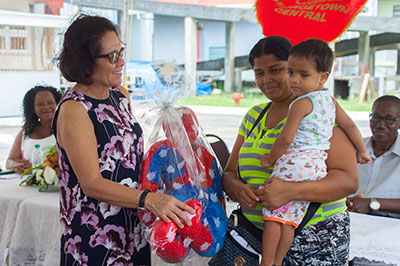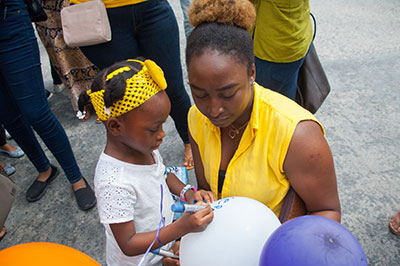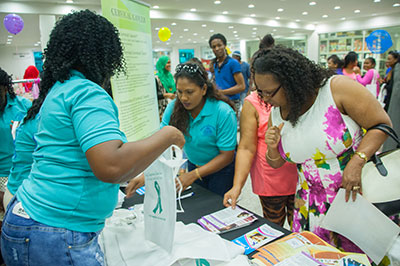…as Guyana observes World Cancer Day
FIRST Lady, Mrs Sandra Granger and Minister of Public Health, Volda Lawrence, were among

The Ministry of Public Health, in commemorating World Cancer Day, Saturday, launched a strong appeal for more persons to join in the campaign to heighten awareness of the high incidence of cancer and deaths. The ministry also emphasised the importance of screening, adding that early detection can have a positive outcome.
This was the high point of the message delivered by Minister of Public Health, Volda Lawrence, at a Balloon Commemoration Ceremony held in the compound of the Georgetown Public Hospital (GPH) in observance of World Cancer Day.
“Early intervention can save lives, while in some cases, early treatment can lead to the person being cured,” Minister Lawrence emphasised. The programme, hosted by the “Giving Hope Foundation & Rotaract Club of Georgetown Central, and headed by Dr Gooding, was

also addressed by First Lady, Mrs Sandra Granger, who made a stirring call for persons to seek early screening to determine if they have cancer cells and to take every precaution to avoid falling victim to cancer.
The event also attracted participation and support from the Ministry of Public Health, other Non-Governmental Organizations, cancer survivors and their families and corporate sponsorship from private-sector entities.
Alluding to the tag line – ‘We Can! I Can!’ – Minister Lawrence noted that more children under the age of 15 are now being diagnosed with the disease. To this end, she made a poignant call for everyone to become engaged in the fight against cancer by making a pledge and

taking action.
“Our position is that everyone can explore either collectively or as individuals, how they can do their part to reduce the global burden of cancer and World Cancer Day is the time to reflect on what you can do. Make a pledge and take action.”
She further noted, “On World Cancer Day, we have an opportunity to collectively examine cancer-control strategies that will accelerate progress. The goal for all of us is to ensure fewer people develop cancer; more people are successfully treated and there is a better quality of life for people during treatment and beyond.”
Minister Lawrence commended the initiative of the NGOs, which include the Rotaract Club of Georgetown Central, the Periwinkle, the Club of the Georgetown Academy and others and

applauded their involvement in the activities which target paediatric cancer patients.
STEP UP AWARENESS
According to Minister Lawrence, the approach of the ministry is to work in collaboration with NGOs and agencies to step up the awareness programme; to extend its outreach to administrative regions; to intensify education programmes on cancer or paediatric cancer in schools, clinics and health centres.
She affirmed that the ministry will improve access to cancer care in secondary health care facilities, beginning with those in hinterland regions; move to invest in cancer control and challenge perception about cancer; encourage health checks and early detection; be a driving force in sensitizing all women in society and to encourage those who are afraid,

reluctant or even skeptical about screening and urge them not to delay, but to overcome their fear.
Meanwhile, stressing the importance of early detection, First Lady, Mrs. Sandra Granger concurred with Minister Lawrence and noted that it would be futile to fight cancer if persons are not screened early.
“Unless that approach is taken, we will always be behind in our fight against cancer, which is life-threatening.”
And noting the increase in cases of cancer in children, the First Lady also stressed that parents need to realize that there must be an ongoing programme of check-ups and testing, so that their children can grow healthy.
Concerned that so many children are now being diagnosed with cancer, the First Lady said it is opportune that research be done to determine the causes.
“It is painful to see a child suffer. It is hard enough to see a grown-up [in agony] so much so, a child,” she remarked.
And commenting on cancer in adults, Mrs. Granger observed that all too often, there are adults who do not get tested or screened for cancer until it is too late.
“Too often we hear of people coming in to the Oncology Unit only to discover they have stage three or stage four cancer, by which time [it is very late]….In stage four cancer, there is nothing much that could be done.”
Cancer is a term used for diseases in which abnormal cells divide without control and can invade other tissues. Cancer cells can spread to other parts of the body through the blood and lymph systems. Cancer is not just one disease, but many diseases. Research shows that screening for cervical and colorectal cancers as recommended, helps prevent these diseases by finding precancerous lesions, so they can be treated before they become cancerous. (CDC).





.jpg)


![Front-page First Lady, Mrs. Granger and Minister of Public Health, Volda Lawrence, join with the Rotaract Club of Georgetown Central, The Giving Hope Foundation and other organizations in releasing 300 balloons into the air to support all persons, especially children, affected by cancer . [Delano Williams photo]](https://guyanachronicle.com/wp-content/uploads/elementor/thumbs/Front-page-1-n3u1j8a2esbpasm2tqhgyexvbql9si6lw3m5d81zvy.jpg)





